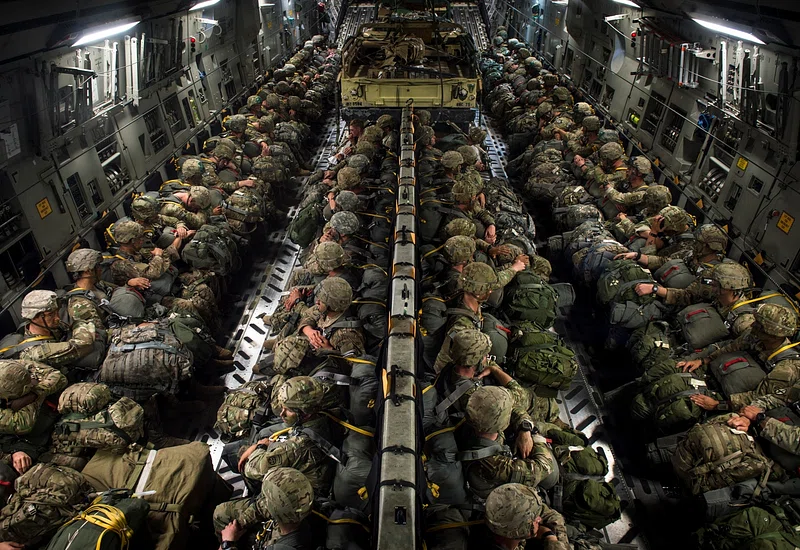
A U.K. defense and security forum says leaked Russian documents indicate Moscow is supplying military gear and know‑how to China that could aid preparations for an airborne invasion of Taiwan.
The Royal United Services Institute’s review draws on roughly 800 pages of material — contracts and equipment lists reportedly obtained from the Black Moon hacktivist group, which previously released some files online. The group’s members aren’t identified; in a manifesto it characterized itself as opposed to governments that pursue aggressive foreign policies.
RUSI researchers provided a selection of the documents to The Associated Press and judged them likely authentic, while noting some files may have been redacted or altered. AP could not independently confirm the records. The batch contains both finalized and draft documents describing meetings between Russian and Chinese delegations, visits to Moscow, and schedules for payments and deliveries of items such as high‑altitude parachute systems and amphibious assault vehicles. While the records suggest Russia has begun producing the equipment, they don’t contain direct evidence that China has paid for or taken delivery of the items.
The analysts warn the systems could be applied to an invasion of Taiwan. Under President Xi Jinping, China has been modernizing its military with the goal of becoming a “world‑class” force by 2050.
U.S. officials have said Xi has directed the military to be ready for a possible Taiwan operation by as early as 2027. Beijing maintains that the self‑ruled democracy is part of China and has not ruled out using force. Although the documents do not explicitly mention Taiwan, RUSI says the gear could provide China with advanced airborne assault capabilities that would be useful in mounting an invasion and could accelerate China’s timeline.
The report’s authors caution it’s not certain that China has decided to invade, but they argue that access to Russian equipment and training within China would make Beijing better prepared if it chose to do so. “The Chinese school of airborne landing is very young,” said one author, suggesting Russian assistance might speed China’s airborne development by a decade or more.
Russian, Chinese and Taiwanese defense and foreign ministry officials did not immediately respond to requests for comment. The analysts say the principal benefit to China would be the operational training and command‑and‑control procedures for parachute forces — areas where Russia has battlefield experience China lacks.
The report portrays Russia as pursuing two goals: expanding its role as a military supplier to China and raising funds for its war in Ukraine. One analyst also speculated Moscow might hope to entangle Beijing in a confrontation with Washington over Taiwan to divert U.S. attention from the war in Ukraine.
Despite Beijing’s overall military advantages, the analysis identifies gaps Russia could help fill, noting Moscow’s long history with airborne units. Beijing’s commentators say Chinese equipment is advanced, but that Russia possesses more combat experience. Experts also suggest parachute insertions would more likely support logistics rather than serve as the invasion’s centerpiece. Still, acquiring Russian systems could let China reverse‑engineer capabilities for broader uses, including surveillance and reconnaissance.
According to a September 2024 document, an initial 2021 agreement set out payment and delivery timelines; stages described as technical analysis, software adaptation and manufacturing were listed as complete. The files indicate Russia agreed to provide in‑country training and a full equipment set for an airborne battalion, including capabilities for special‑forces infiltration. The package purportedly includes 37 light amphibious assault vehicles, 11 amphibious anti‑tank self‑propelled guns, 11 airborne armored personnel carriers, plus command and observation vehicles, for a price exceeding $210 million. The documents say China requested the vehicles be fitted with Chinese communications and adapted to fire Chinese ammunition.
RUSI reports Russia also agreed to sell high‑altitude parachute systems able to carry loads up to 190 kilograms from extreme altitudes. Minutes from a March 8, 2024 Moscow meeting reportedly show Russia committed to providing data by the end of 2024 about system performance in temperatures down to –60°C (–76°F). Beijing requested tests for drops from 8,000 meters (about 26,250 feet). Such drop altitudes could allow forces to glide up to roughly 80 kilometers (50 miles), enabling small special‑forces teams to penetrate territory covertly, RUSI said. One analyst suggested the system could support “stage zero” operations in which equipment and personnel are inserted covertly from aircraft operating outside Taiwanese airspace.
The report also recalls Russia’s troubled use of airborne forces in Ukraine. In February 2022, early efforts to seize Hostomel airfield and establish an airbridge for reinforcements failed after helicopters were struck before reaching their objective. Western analysts say those setbacks contributed to Russia’s inability to achieve a quick victory, and that Moscow has since drawn on legacy stocks and increased weapons production. Nonetheless, analysts say those problems do not preclude Moscow from selling equipment to China; they note the airborne systems outlined would be relevant mainly to an invasion‑phase operation, not Russia’s campaign in Ukraine.
The authors conclude that China’s operational challenge would be to succeed where Russia did not: suppress Taiwan’s air defenses and land enough troops and material quickly enough to defeat Taipei’s forces before full mobilization. The report suggests a possible tactic would be airdropping armored vehicles onto golf courses near ports and airfields, allowing airborne units to clear routes for follow‑on landings.




